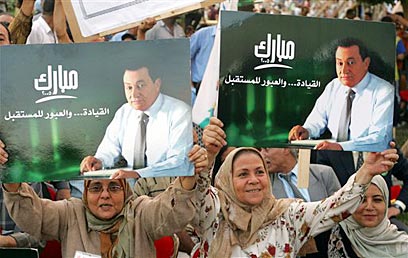
Egypt prepares for historic elections
In two days, Egyptians will hit polls for first open elections since 1952; opposition parties not expected to topple Mubarak, but complaints have been made slamming elections as ‘illusion'
For Egyptian citizens, democracy in the Western sense of the word begins this coming Wednesday, as Egypt’s first open presidential elections since the officers' revolt in 1952 are set to take place.
For the first time, candidates other than Egyptian president Muhammad Hosni Mubarak will run of the country's top job. Mubarak has ruled Egypt since 1981, after his predecessor, President Anwar Sadat, was assassinated by Islamic extremists.
After months of internal protest, coupled with intensive American pressure, Mubarak announced a few months ago that clause 76 in the Egyptian constitution would be changed, opening the door to presidential elections featuring several candidates.
Up until now, the Egyptians were used to "election campaigns" limited to the Egyptian parliament. These saw candidates argue over a number of issues, but no one dared challenge the institution of the presidency itself.

Mubarak supporters out on the streets (Photo: AP)
A new era?
Is this a new era? Egyptian opposition figures are skeptical. Some claim that the change to the Egyptian constitution does not allow independent candidates to run, because each new candidate requires to present a million signatures of Egyptian citizens, a requirement not asked of current party leaders. In short, the elections are an illusion, they say.
Around 32 million Egyptians are eligible to take part in the upcoming elections, but the main opposition group, the Muslim Brotherhood, is not allowed to field candidates.
Among the candidates who will attempt to challenge the president are Doctor Ayman Nur, head of the al-Ghad (tomorrow) party.
Nur, an Egyptian parliament member and a former lawyer and journalist, has promised to carry out sweeping reforms in the country and to change the Egyptian political structure. Also in Nur’s sights are the economy, and social inequality. Nur has said he will introduce across the board changes within two years, and has committed himself to creating millions of jobs and making unemployment a thing of the past.
Emergency laws
Mubarak, for his part, has promised to continue his own reforms. He told the Egyptian people that he will cancel emergency laws which are still in effect, and has vowed to combat unemployment and offer more attractive mortgages to young couples.
Housing for Egypt’s burgeoning young population is one of the hottest issues in the country’s political arena.
Egypt, which has rejected calls to allow its elections to be supervised by international monitors, has agreed to allow parties to send representatives to all polls.
An organization of judges has also decided to take part in the monitoring of the elections, despite their opposition to Mubarak’s decision to separate the judiciary from the elections.
Opposition figures have accused Mubarak of distancing the judges for fear that they were not loyal to his National Democratic party.
In the Egyptian media, analysts have said that the elections are a test of the ability of the Egyptian people to vote, and to prove that there is no longer a monopoly of power in the country.
“It prepares the Egyptian people in effect to demand the replacement, or the election of leaders, who up until now have appeared to be in their position forever,” wrote an Egyptian columnist.
At the start of the week, Egyptian polls indicated that 82 - 90 percent of voters would choose Mubarak.
Israel has not been a major topic in the elections. In general, all of the candidates are committed to respecting all of Egypt’s treaties with other nations.










